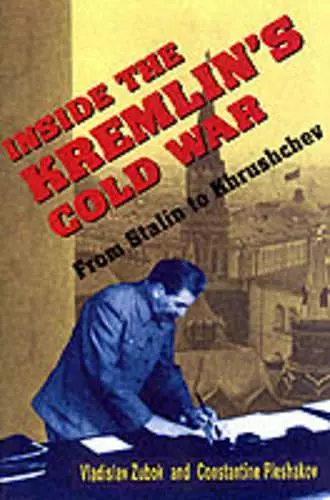Inside the Kremlin’s Cold War
From Stalin to Khrushchev
Constantine Pleshakov author Vladislav Zubok author
Format:Paperback
Publisher:Harvard University Press
Published:25th May '97
Should be back in stock very soon

Two of Russia's most accomplished Cold War historians have brought us a treasure trove of arresting new information, insights, and judgments that do much to change our understanding of the Soviet Union's motives and behavior during its long and tragic confrontation with the West -- Michael R. Beschloss, author of The Crisis Years: Kennedy and Khrushchev, 1960-1963
Covering the volatile period from 1945 to 1962, Zubok and Pleshakov explore the personalities and motivations of the key people who directed Soviet political life and shaped Soviet foreign policy.
Covering the volatile period from 1945 to 1962, Vladislav Zubok and Constantine Pleshakov explore the personalities and motivations of the key people who directed Soviet political life and shaped Soviet foreign policy. They begin with the fearsome figure of Joseph Stalin, who was driven by the dual dream of a Communist revolution and a global empire. They reveal the scope and limits of Stalin’s ambitions by taking us into the world of his closest subordinates, the ruthless and unimaginative foreign minister Molotov and the Party’s chief propagandist, Zhdanov, a man brimming with hubris and missionary zeal. The authors expose the machinations of the much-feared secret police chief Beria and the party cadre manager Malenkov, who tried but failed to set Soviet policies on a different course after Stalin’s death. Finally, they document the motives and actions of the self-made and self-confident Nikita Khrushchev, full of Russian pride and party dogma, who overturned many of Stalin’s policies with bold strategizing on a global scale. The authors show how, despite such attempts to change Soviet diplomacy, Stalin’s legacy continued to divide Germany and Europe, and led the Soviets to the split with Maoist China and to the Cuban missile crisis.
Zubok and Pleshakov’s groundbreaking work reveals how Soviet statesmen conceived and conducted their rivalry with the West within the context of their own domestic and global concerns and aspirations. The authors persuasively demonstrate that the Soviet leaders did not seek a conflict with the United States, yet failed to prevent it or bring it to conclusion. They also document why and how Kremlin policy-makers, cautious and scheming as they were, triggered the gravest crises of the Cold War in Korea, Berlin, and Cuba. Taking us into the corridors of the Kremlin and the minds of its leaders, Zubok and Pleshakov present intimate portraits of the men who made the West fear, to reveal why and how they acted as they did.
Reads like a page-flipping thriller… Accounts of [Cold War] events are now bolstered for the first time with firm, enlightened documentary evidence… Offers—both to historians and to the lay generations who inherited the fear without the facts—invaluable insights into the pervasive, simmering war that forged the dominant mindset of the latter part of the twentieth century. -- John O’Mahony * Financial Times *
[This book is] the most significant addition to the literature on Soviet foreign policy to have appeared since the end of the Cold War. -- Robert Legvold * Foreign Affairs *
A Russian publishing a book in the bygone Soviet era that analyzed foreign policy in terms of its architects would have been unthinkable… Most Americans of the time would have found equally unthinkable the suggestion that the Kremlin was home to anyone other than evil tyrants cut from the same drab cloth… What pleasure it is, then, that such previously unthinkable thoughts pop from every page of Vladislav Zubok and Constantine Pleshakov’s Inside the Kremlin’s Cold War. -- Jane E. Good * Washington Post Book World *
Despite the plethora of books on the origins and course of the Cold War, none have provided a documented inside account of the Soviet role in that conflict. Vladislav Zubok and Constantine Pleshakov are the first to help close the gap by drawing on official archives opened since the Soviet collapse… Calling for a rethinking of the Soviet role in view of new evidence, the authors say that the ‘human factor,’ or how personality skewed policy, has been underplayed in the literature. They offer a revealing account of the actions of Stalin and his lieutenants and then of Khrushchev and his circle. -- Carl A. Linden * American Historical Review *
[The authors] have produced a remarkably readable book…[where] new details are brought to light and several old suspicions confirmed… Zubok and Pleshakov are to be commended for their efforts. They have written a book which is as scholarly profound as accessible to a broad audience. -- Kees Boterbloem * Canadian Slavonic Papers *
This is a much-awaited book from two prominent young Russian historians. Covering the period from 1945 to 1962, Zubok and Pleshakov provide a fascinating look at the issues and, in particular, the personalities involved in the shaping of Soviet foreign policy from the end of World War II to the Cuban Missile Crisis. Largely relying on recently opened Soviet archives, the authors weave a picture of the Kremlin’s elite, their internal struggles, differences of opinion, how they viewed the West and their Communist allies, and why they triggered some of the gravest Cold War crises (Berlin, Korea, Cuba, and so on)… The authors must be commended for one of the most important books on the Soviet side of the Cold War to have appeared in the last decade. -- J. Hanhimäki * Slavonic Review *
Two of Russia’s most accomplished Cold War historians have brought us a treasure trove of arresting new information, insights, and judgments that do much to change our understanding of the Soviet Union’s motives and behavior during its long and tragic confrontation with the West. -- Michael R. Beschloss, author of The Crisis Years: Kennedy and Khrushchev, 1960–1963
ISBN: 9780674455320
Dimensions: unknown
Weight: 435g
382 pages